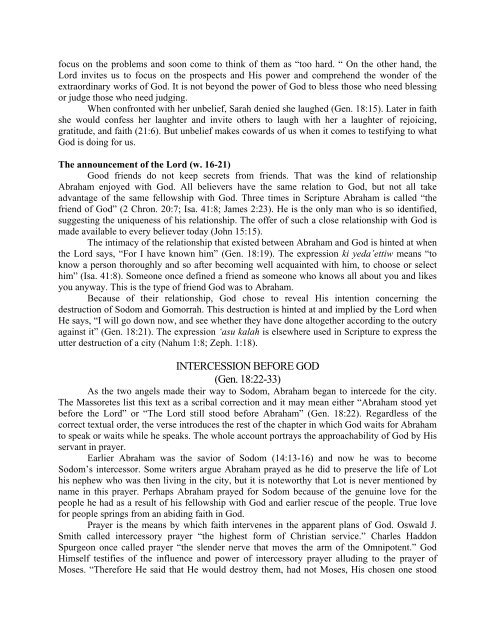A Journey Through The Old Testament - Elmer Towns
A Journey Through The Old Testament - Elmer Towns
A Journey Through The Old Testament - Elmer Towns
Create successful ePaper yourself
Turn your PDF publications into a flip-book with our unique Google optimized e-Paper software.
focus on the problems and soon come to think of them as “too hard. “ On the other hand, the<br />
Lord invites us to focus on the prospects and His power and comprehend the wonder of the<br />
extraordinary works of God. It is not beyond the power of God to bless those who need blessing<br />
or judge those who need judging.<br />
When confronted with her unbelief, Sarah denied she laughed (Gen. 18:15). Later in faith<br />
she would confess her laughter and invite others to laugh with her a laughter of rejoicing,<br />
gratitude, and faith (21:6). But unbelief makes cowards of us when it comes to testifying to what<br />
God is doing for us.<br />
<strong>The</strong> announcement of the Lord (w. 16-21)<br />
Good friends do not keep secrets from friends. That was the kind of relationship<br />
Abraham enjoyed with God. All believers have the same relation to God, but not all take<br />
advantage of the same fellowship with God. Three times in Scripture Abraham is called “the<br />
friend of God” (2 Chron. 20:7; Isa. 41:8; James 2:23). He is the only man who is so identified,<br />
suggesting the uniqueness of his relationship. <strong>The</strong> offer of such a close relationship with God is<br />
made available to every believer today (John 15:15).<br />
<strong>The</strong> intimacy of the relationship that existed between Abraham and God is hinted at when<br />
the Lord says, “For I have known him” (Gen. 18:19). <strong>The</strong> expression ki yeda’ettiw means “to<br />
know a person thoroughly and so after becoming well acquainted with him, to choose or select<br />
him” (Isa. 41:8). Someone once defined a friend as someone who knows all about you and likes<br />
you anyway. This is the type of friend God was to Abraham.<br />
Because of their relationship, God chose to reveal His intention concerning the<br />
destruction of Sodom and Gomorrah. This destruction is hinted at and implied by the Lord when<br />
He says, “I will go down now, and see whether they have done altogether according to the outcry<br />
against it” (Gen. 18:21). <strong>The</strong> expression ‘asu kalah is elsewhere used in Scripture to express the<br />
utter destruction of a city (Nahum 1:8; Zeph. 1:18).<br />
INTERCESSION BEFORE GOD<br />
(Gen. 18:22-33)<br />
As the two angels made their way to Sodom, Abraham began to intercede for the city.<br />
<strong>The</strong> Massoretes list this text as a scribal correction and it may mean either “Abraham stood yet<br />
before the Lord” or “<strong>The</strong> Lord still stood before Abraham” (Gen. 18:22). Regardless of the<br />
correct textual order, the verse introduces the rest of the chapter in which God waits for Abraham<br />
to speak or waits while he speaks. <strong>The</strong> whole account portrays the approachability of God by His<br />
servant in prayer.<br />
Earlier Abraham was the savior of Sodom (14:13-16) and now he was to become<br />
Sodom’s intercessor. Some writers argue Abraham prayed as he did to preserve the life of Lot<br />
his nephew who was then living in the city, but it is noteworthy that Lot is never mentioned by<br />
name in this prayer. Perhaps Abraham prayed for Sodom because of the genuine love for the<br />
people he had as a result of his fellowship with God and earlier rescue of the people. True love<br />
for people springs from an abiding faith in God.<br />
Prayer is the means by which faith intervenes in the apparent plans of God. Oswald J.<br />
Smith called intercessory prayer “the highest form of Christian service.” Charles Haddon<br />
Spurgeon once called prayer “the slender nerve that moves the arm of the Omnipotent.” God<br />
Himself testifies of the influence and power of intercessory prayer alluding to the prayer of<br />
Moses. “<strong>The</strong>refore He said that He would destroy them, had not Moses, His chosen one stood
















